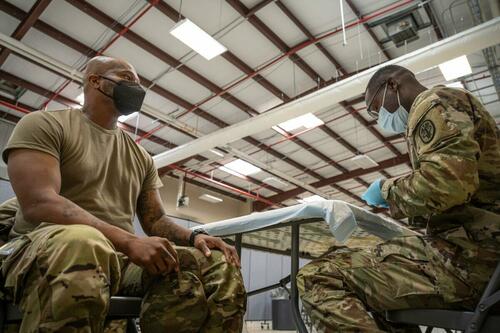
Authored by Zachary Stieber via The Epoch Times (emphasis ours),
Cases of myocarditis soared among U.S. service members in 2021 after the COVID-19 vaccines were rolled out, a top Pentagon official has confirmed.

There were 275 cases of myocarditis in 2021—a 151 percent spike from the annual average from 2016 to 2020, according to Gilbert Cisneros Jr., undersecretary of defense for personnel and readiness, who confirmed data revealed by a whistleblower earlier this year.
The COVID-19 vaccines can cause myocarditis, a form of heart inflammation that can lead to mortality, including sudden death. COVID-19 also can cause myocarditis.
The diagnosis data comes from the Defense Medical Epidemiology Database.
Mr. Cisneros provided the rate of cases per 100,000 person-years, a way to measure risk across a certain period of time. In 2021, the rate was 69.8 among those with prior infection, compared to 21.7 among members who had been vaccinated.
“This suggests that it was more likely to be [COVID-19] infection and not COVID-19 vaccination that was the cause,” Mr. Cisneros said.
No figures were given for members who had been vaccinated but were also infected. The total rate, 20.6, also indicates that some members weren’t included in the subgroup analysis.
Sen. Ron Johnson (R-Wis.), who has been investigating problems with the database, questioned how the military came up with the figures.
“It is unclear whether or how it accounted for service members who had a prior COVID-19 infection and received a COVID-19 vaccination,” Mr. Johnson wrote to Mr. Cisneros.
Department of Defense (DOD) officials didn’t respond to a request for comment.
Mr. Johnson asked for the information no later than Aug. 2.
Dr. Peter McCullough, a cardiologist and president of the McCullough Foundation, looked at the newly disclosed data.
“The large increase in myocarditis cases in our military in 2021 was most likely due to ill-advised COVID-19 vaccination,” he told The Epoch Times via email, pointing to a study from Israel that found no increase or myocarditis in COVID-19 patients.
Some other papers have found COVID-19 vaccines increase the risk of myocarditis. COVID-19 has been linked elsewhere to myocarditis, although the vaccines have never prevented infection and have become increasingly ineffective against it.
The military encouraged COVID-19 vaccination after U.S. regulators cleared the vaccines for use in late 2020. Military officials were among the first in the world to raise concerns about myocarditis after vaccination and published an early case series of 22 previously healthy members who suffered myocarditis within four days of receiving a COVID-19 vaccine. U.S. officials have since said the vaccines definitely cause myocarditis.
U.S. Defense Secretary Lloyd Austin mandated the vaccines in 2021, a requirement that remained in place until Congress forced its withdrawal.

Repeated Changes
Military officials have struggled to provide accurate data on 2021 diagnoses.
Whistleblowers revealed in 2021 that myocarditis, as reflected in the Defense Medical Epidemiology Database (DMED), had soared to 2,868 percent higher than the average from 2016 to 2020. They downloaded the data in August 2021.
The number of 2021 myocarditis diagnoses, though, had plummeted from 1,239 to 263 when the data was downloaded later, prompting concerns of manipulation.
Military officials said they reviewed the data and found it was “faulty.” They said the data for the years 2016 to 2020 were “corrupted” during a “database maintenance process,” which resulted in the display of only 10 percent of the actual medical encounters for that time period.
Officials told Mr. Johnson in 2022 that the problem had been fixed. The fix significantly changed the records. Instead of a 2,181 percent increase in hypertension in 2021, for instance, the increase was just 1.9 percent. Female infertility, instead of increasing 472 percent, increased 13.2 percent.
The updated percentages, though, were called into question when another whistleblower looked at the database in 2023 and found they were different.
Testicular cancer, initially pegged as increasing 369 percent, was placed at 3 percent by the military. But the actual increase was 16.3 percent, the whistleblower found. Pulmonary embolism was among the other conditions that occurred more often in 2021 than the military had conveyed.
The whistleblower alerted Mr. Johnson, the top Republican on the Senate Subcommittee on Investigations, who asked military officials for answers.
Mr. Cisneros acknowledged that the data given to the senator was incomplete. He said the change stemmed from December 2021 figures not being available when the corrected data was offered. There was a data “lag by about three months,” meaning the data wasn’t available in February 2022, when officials provided Mr. Johnson with the corrected data, Mr. Cisneros said.
Pentagon officials replicated the analyses from the whistleblower and found the data “are similar” to the data the whistleblower sent to Mr. Johnson, Mr. Cisneros said.
Military officials hadn’t previously mentioned any data lag previously while communicating with Mr. Johnson or the public, and they didn’t incorporate the available data when they sent him another missive in mid-2022.
“Without the whistleblower’s disclosure, I doubt DOD would have ever acknowledged that it provided incomplete information to my office in February 2022 and again in July 2022,” Mr. Johnson said.
He said the DOD had demonstrated “a complete disregard for transparency” and urged officials to make clear whether it has investigated whether any of the medical conditions for which diagnoses spiked are associated with the vaccines.
Authored by Zachary Stieber via The Epoch Times (emphasis ours),
Cases of myocarditis soared among U.S. service members in 2021 after the COVID-19 vaccines were rolled out, a top Pentagon official has confirmed.

There were 275 cases of myocarditis in 2021—a 151 percent spike from the annual average from 2016 to 2020, according to Gilbert Cisneros Jr., undersecretary of defense for personnel and readiness, who confirmed data revealed by a whistleblower earlier this year.
The COVID-19 vaccines can cause myocarditis, a form of heart inflammation that can lead to mortality, including sudden death. COVID-19 also can cause myocarditis.
The diagnosis data comes from the Defense Medical Epidemiology Database.
Mr. Cisneros provided the rate of cases per 100,000 person-years, a way to measure risk across a certain period of time. In 2021, the rate was 69.8 among those with prior infection, compared to 21.7 among members who had been vaccinated.
“This suggests that it was more likely to be [COVID-19] infection and not COVID-19 vaccination that was the cause,” Mr. Cisneros said.
No figures were given for members who had been vaccinated but were also infected. The total rate, 20.6, also indicates that some members weren’t included in the subgroup analysis.
Sen. Ron Johnson (R-Wis.), who has been investigating problems with the database, questioned how the military came up with the figures.
“It is unclear whether or how it accounted for service members who had a prior COVID-19 infection and received a COVID-19 vaccination,” Mr. Johnson wrote to Mr. Cisneros.
Department of Defense (DOD) officials didn’t respond to a request for comment.
Mr. Johnson asked for the information no later than Aug. 2.
Dr. Peter McCullough, a cardiologist and president of the McCullough Foundation, looked at the newly disclosed data.
“The large increase in myocarditis cases in our military in 2021 was most likely due to ill-advised COVID-19 vaccination,” he told The Epoch Times via email, pointing to a study from Israel that found no increase or myocarditis in COVID-19 patients.
Some other papers have found COVID-19 vaccines increase the risk of myocarditis. COVID-19 has been linked elsewhere to myocarditis, although the vaccines have never prevented infection and have become increasingly ineffective against it.
The military encouraged COVID-19 vaccination after U.S. regulators cleared the vaccines for use in late 2020. Military officials were among the first in the world to raise concerns about myocarditis after vaccination and published an early case series of 22 previously healthy members who suffered myocarditis within four days of receiving a COVID-19 vaccine. U.S. officials have since said the vaccines definitely cause myocarditis.
U.S. Defense Secretary Lloyd Austin mandated the vaccines in 2021, a requirement that remained in place until Congress forced its withdrawal.

Repeated Changes
Military officials have struggled to provide accurate data on 2021 diagnoses.
Whistleblowers revealed in 2021 that myocarditis, as reflected in the Defense Medical Epidemiology Database (DMED), had soared to 2,868 percent higher than the average from 2016 to 2020. They downloaded the data in August 2021.
The number of 2021 myocarditis diagnoses, though, had plummeted from 1,239 to 263 when the data was downloaded later, prompting concerns of manipulation.
Military officials said they reviewed the data and found it was “faulty.” They said the data for the years 2016 to 2020 were “corrupted” during a “database maintenance process,” which resulted in the display of only 10 percent of the actual medical encounters for that time period.
Officials told Mr. Johnson in 2022 that the problem had been fixed. The fix significantly changed the records. Instead of a 2,181 percent increase in hypertension in 2021, for instance, the increase was just 1.9 percent. Female infertility, instead of increasing 472 percent, increased 13.2 percent.
The updated percentages, though, were called into question when another whistleblower looked at the database in 2023 and found they were different.
Testicular cancer, initially pegged as increasing 369 percent, was placed at 3 percent by the military. But the actual increase was 16.3 percent, the whistleblower found. Pulmonary embolism was among the other conditions that occurred more often in 2021 than the military had conveyed.
The whistleblower alerted Mr. Johnson, the top Republican on the Senate Subcommittee on Investigations, who asked military officials for answers.
Mr. Cisneros acknowledged that the data given to the senator was incomplete. He said the change stemmed from December 2021 figures not being available when the corrected data was offered. There was a data “lag by about three months,” meaning the data wasn’t available in February 2022, when officials provided Mr. Johnson with the corrected data, Mr. Cisneros said.
Pentagon officials replicated the analyses from the whistleblower and found the data “are similar” to the data the whistleblower sent to Mr. Johnson, Mr. Cisneros said.
Military officials hadn’t previously mentioned any data lag previously while communicating with Mr. Johnson or the public, and they didn’t incorporate the available data when they sent him another missive in mid-2022.
“Without the whistleblower’s disclosure, I doubt DOD would have ever acknowledged that it provided incomplete information to my office in February 2022 and again in July 2022,” Mr. Johnson said.
He said the DOD had demonstrated “a complete disregard for transparency” and urged officials to make clear whether it has investigated whether any of the medical conditions for which diagnoses spiked are associated with the vaccines.
Loading…





